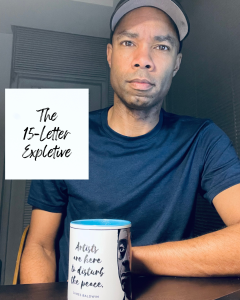
It happens to us all. We tell ourselves we’re going to sit down and start the book we’ve always wanted to write. Or we’re going to organize our receipts ahead of filing our taxes so that we’re not doing it at the last minute. Or maybe we’re determined to cut out those sugary after-dinner treats, but devour half a bag of Oreos instead and say, “I’ll start tomorrow.” Those are, my dear friends, a few examples that stem from a 15-letter expletive I want us to—as much as humanly possible—learn to manage than try to eliminate altogether: procrastination.
Defining Procrastination
If we define procrastination as “delaying a task for a maladaptively long time,” then it’s something we’ve all done. You may see it as a question of time management or an issue of emotion management, but in both cases they derail our plans. Because in this digital age, it’s easier to pick up our phones and swipe unconsciously or stream the last hot show on Netflix (or whatever streaming service you’re subscribed to). We lose hours of time, and if you’re like me, end up silently berating ourselves for wasting time.
My advice is, never do tomorrow what you can do today. Procrastination is the thief of time. Collar him! – Charles Dickens
Perspective
While I don’t seriously consider procrastination to be a 15-letter expletive, it does show that how we see procrastination is important to finding ways to manage it. Let me repeat that. You manage procrastination. You can’t eliminate it altogether. Some may see procrastination as a sign of laziness while for others it represents pragmatism. Still others may see it as a bad habit (in that case is it a 15-letter expletive?) or as something that is good.
I have mostly, for better or for worse, thought of procrastination as falling into the laziness/bad habit camps. Because if I’m not getting things done when I need to do them, then I feel like I’ve fallen short of the mark. But I’ve come to realize that, again for me, it’s not about negative or positive procrastination. My procrastination habit loop has always been a result of me not being able to effectively manage distractions.
I need to, then, break that loop. But how?
Learning from Others
If you’ve heard of Andy Frisella, then you’ve probably also heard of his 75 Hard program. Frisella describes 75 Hard as the ‘ironman for your brain,’ not as a fitness program. And if you follow it, he believes it will allow you to 100x traits in your life like confidence, self-esteem, self-worth, self-believe, grittiness and fortitude. There are rules for 75 Hard, one of which is no alcohol. That’s easy for me since I’ve been sober since January 2018.
I’m not recommending 75 Hard, and I’m currently not following the program. But I mention it because it inspired me to figure how I could improve upon my own mental toughness and discipline, and get things done.
30–60–90
No matter how much I’ve tried over the past few years, I’ve always seemed to slip back into my procrastination habit loop. Social media time outs helped, briefly, to increase productivity, but the results (for me) were never long-lasting. Because in order to stay true to my why, I needed a system to effectively manage distractions. And so, inspired by Frisella’s 75 Hard, I’m testing out a system of 30–60–90.
It’s about what do I need to do, and what do I need to avoid, to not only be productive but to live the life I imagine for myself. For awhile, I felt like I wasn’t reading enough. I decided, then, that I’d read 10 pages a day of non-fiction and fiction (and I end up reading more than that once I start). I need to drink more water, so I’m committing to drinking two litres of water a day. And I was compulsively checking news sites, and knew I had to stop.
The Results
For the past 32 days, I have read 10 (or more) pages a day of fiction and non-fiction. I’ve drank at least two litres of water every day. I haven’t visited CNN, BBC, or any other news site. I haven’t streamed a movie or TV show (because I know myself and had to unsubscribe and block access to all the sites). I’ve stayed consistent with my intermittent fasting (16–20 hours). As well, what started out as a daily, minimum 20-minute workout is edging closer to 30 minutes as I build strength and add more reps.
Having completed 30-plus days, I’ve extended it to 60, adding additional to-dos and don’ts to help me level up even more. And at the end of 60 days, I’ll extend it again to 90. It is by no means a perfect system, because over the recent long weekend I found another way to procrastinate that I added to the list of don’ts for this next 30-day period. But in a lot of ways, it is helping me to reduce the intrusion of that 15-letter expletive into my daily life. And if I can become 0.0001 percent better each day, then I can stay true to my why and become who I dare to be.
Leave a Reply